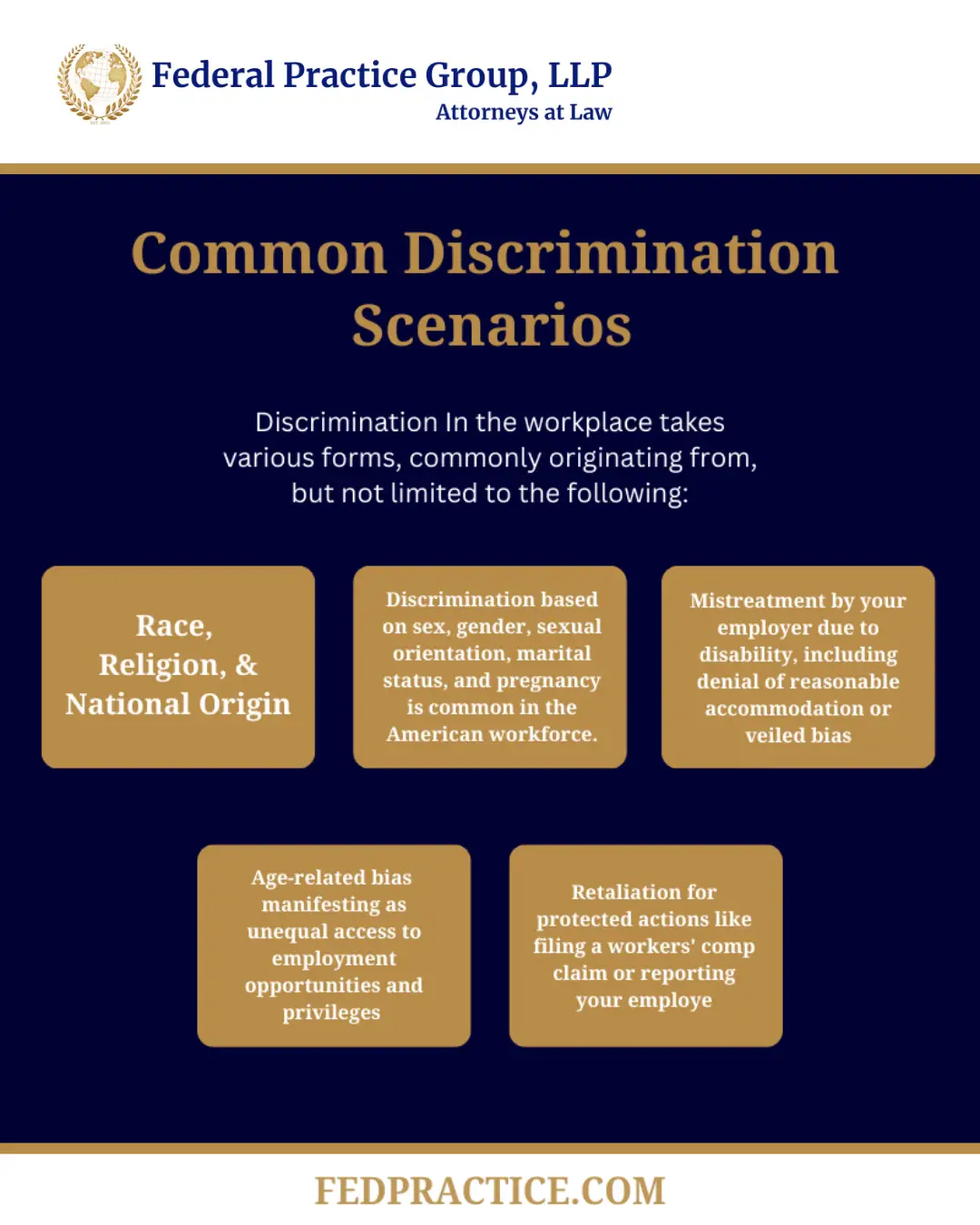Federal Employee Discrimination Attorney

Discrimination Claims for Federal Employees
When an employee that works for the federal government has been discriminated against in the workplace, it warrants contacting a federal employee discrimination attorney from the Federal Practice Group for support. Depending on the type of discrimination, there may be a course of action so that the employee can seek remedy and restitution for what they experienced.
Keep in mind, that as a federal employee or applicant, you are protected by law from discrimination due to your gender identity, pregnancy status, sexual orientation, religion, color, race, age, national origin, genetic information, or disability. But sadly, all too often innocent people are discriminated against because someone decided to act with malice or blatant insensitivity.
You do not need a lawyer to file a claim with the Equal Employment Opportunity Commission (EEOC). You can file a claim with the EEOC on your own, and the EEOC will investigate your claim and determine whether there is reasonable cause to believe that discrimination occurred. However, you may want to consider consulting with an attorney who specializes in employment law to help you navigate the process, understand your rights, and ensure that you have the best possible chance of success. An attorney can also advise you on the merits of your claim and the potential remedies available to you. Contact Federal Practice Group today.
Table of Contents
- Discrimination Claims for Federal Employees
- EEOC Discrimination Claims
- 10 Signs You Might Be Experiencing Discrimination in the Workplace
- Federal Employee Discrimination Infographic
- Federal Employee Discrimination Statistics
- Federal Employee Discrimination FAQs
- Federal Employee Discrimination Glossary
- Contact Our Federal Employee Discrimination Attorney Today
Common Types of Federal Employee Discrimination
Discrimination in the workplace should never be tolerated. Unfortunately, it occurs in many forms. There are several reasons why an employee could be discriminated against at work. There may be bias against them because of their identity, or a supervisor or manager may believe that they will not be able to perform as well as other employees in the workplace. When discrimination occurs, it can appear in many ways. Examples of discrimination can include:
- Racial Discrimination. When an employee is discriminated against because of their racial identity, ethnicity, nationality, or skin color, it is categorized as racial discrimination. All federal workplaces should be inclusive of every individual regardless of their race. An example of racial discrimination is when an employee of a certain race is intentionally not being considered for promotion compared to their peers who are of other racial identities.
- Sex and Gender Discrimination. An employee can be discriminated against because of their sex, gender or sexual orientation. Examples of this form of discrimination include harassment of an individual because of their sex or preventing an employee from advancing in the workplace.
If you are a federal employee or applicant and suspect that discrimination has happened to you, we urge you to get our help now. You have the right to file a complaint and not accept what has happened to you. And if it occurred once, it may happen again and again. Let an attorney for employee federal discrimination from the Federal Practice Group intervene to halt the discrimination and see that you are fairly compensated for the anguish and inconvenience.
After submitting your formal complaint, the agency will look over your statements and decide if it is sufficient to move forward or not. Please let us help you write up your formal complaint, as this will increase your odds of the response you are hoping for. Your case will either be dismissed or the agency will perform an investigation, which they have 180 days from your filing to complete. Once it is finished, the agency will send you a notice that offers a couple of choices: you can ask for a hearing in front of an EEOC Administrative Judge, or you can request that the agency conclude a verdict for your case now.
Sometimes the U.S. Equal Employment Opportunity Commission makes a misjudgment. With our help, you can appeal the decision or dispute it in federal district court. Now, if you already filed your complaint and received a verdict you are not happy with but have yet to file an appeal, we strongly advise getting a lawyer to help you with the rest of the process.
EEOC Discrimination Claims
The hallmarks of an Equal Employment Opportunity Commission (EEOC) discrimination claim typically include:
- Protected characteristic: The claimant must belong to a protected class under federal anti-discrimination laws, such as race, color, religion, sex, national origin, age, disability, or genetic information.
- Adverse employment action: The claimant must have experienced an adverse employment action, such as termination, demotion, denial of promotion or training, or a reduction in pay, benefits, or responsibilities.
- Discriminatory intent: The claimant must provide evidence that the adverse employment action was motivated by discrimination based on their protected characteristic. This can be shown by direct evidence, such as discriminatory comments, or indirect evidence, such as disparate treatment or impact.
- Causal connection: The claimant must show a causal connection between the adverse employment action and the discriminatory intent. This means demonstrating that the adverse employment action would not have occurred but for the discriminatory intent.
- Timeliness: The claimant must file their claim with the EEOC within the required time frame, typically within 180 days of the alleged discrimination (or 300 days if the claim is also covered by a state anti-discrimination law).
As a federal employee, you are shielded by laws that prohibit workplace discrimination. Yet, navigating the complexities of filing a discrimination claim can be a daunting task. To bolster your chances of success and to ensure your rights are fully protected, consulting with a seasoned federal employment attorney, like those at the Federal Practice Group, can be beneficial.
From drafting your formal complaint to increasing your odds of a favorable agency response, our team of experienced attorneys will guide you every step of the way. Furthermore, if the agency’s investigation results in a misjudgment, our team can assist in appealing the decision or taking the dispute to federal district court.

10 Signs You Might Be Experiencing Discrimination In The Workplace
Are you being discriminated against in the workplace? If you notice that people around you seem to be given more opportunities than you are or that you’re always left with the short end of the stick, it could be due to your performance. However, it could also be discrimination. Here are 10 signs that you could be a victim of workplace discrimination—and if you feel you are, please contact a federal employee discrimination attorney from Federal Practice Group today to learn about your legal options: Workplace discrimination can take many forms, and recognizing the signs is the first step toward addressing it. If you suspect that you might be facing discrimination, here are ten signs to watch for:
- Unequal Treatment
This may manifest in several ways, including fewer opportunities for advancement or being given desirable assignments than your peers.
- Negative Stereotyping
Comments or jokes where the punchline is a racist or stereotypical comment could indicate an accepted culture of discrimination in the workplace.
- Exclusion from Meetings or Events
If you’re consistently left out of social gatherings, team-building events, or even not invited to meetings you should be a part of, it could be reflective of bias in the workplace.
- Unfair Disciplinary Actions
Are you receiving harsh disciplinary action for acts (or inaction) that others get a slap on the wrist for? If you receive harsher penalties for violating workplace protocols than your peers, it could be due to bias or discrimination.
- Inconsistent Performance Reviews
If your performance reviews are unduly harsh, or if you’re getting dinged for infractions that are overlooked for others without clear justification from your supervisor, then it may be time to consult with a federal employee discrimination attorney.
- Hostile Work Environment
If you often feel uncomfortable at work because of offensive conversations or targeted remarks, or if you’re being harassed by your peers or supervisor, then you could be in a toxic workplace and have legal rights to file a complaint.
- Retaliation for Speaking Up
You have the right to file a complaint with Human Resources or your supervisor if you believe you are the victim of unfair treatment or discrimination. If you face retaliation, like being fired, demoted, or transferred, speak with an employment lawyer immediately.
- Inconsistent Hiring Practices
Have you noticed a consistent pattern of candidates who share membership in a certain protected class (age, religion, race, color, etc.) not being hired or being overlooked for promotions or plum assignments? It could reflect a larger pattern of discrimination in the workplace.
- Lack of Diversity in Leadership
Homogenous leadership in a workplace where there is much diversity could indicate systemic discrimination in your workplace, especially with regard to who is promoted and who isn’t. Certain groups may have unfair barriers to advancement.
- Discriminatory Comments or Jokes
Belittling individuals over their race, color, sex, age, or other immutable aspects is unacceptable and should not be tolerated in the workplace. If your coworkers are making jokes about you or other members of protected classes, it often indicates tolerance of this behavior at higher levels.
Federal Employee Discrimination Infographic

Federal Employee Discrimination Statistics
The Equal Employment Opportunity Commission (EEOC) publishes annual statistics on federal employee discrimination claims. Here are some highlights from the most recent report:
- In Fiscal Year 2020, there were 7,759 new discrimination complaints filed by federal employees and applicants.
- The most common bases of discrimination alleged were reprisal (53.7%), race (34.7%), and sex (33.4%).
- The most common issues alleged were non-selection for a job (27.4%), harassment (18.4%), and discipline (14.2%).
- The EEOC resolved 7,475 complaints, resulting in $88.6 million in relief for complainants.
- The average processing time for a complaint was 463 days.
- Federal agencies reported a total workforce of 2,115,234 employees in FY 2020, of which 58.6% were male and 41.4% were female. The percentage of minority employees was 38.2%.
Federal Employee Discrimination FAQs
What Is Federal Employee Discrimination?
Federal employee discrimination refers to unfair treatment or harassment of an individual in the workplace based on their race, color, religion, sex, national origin, age, disability, or genetic information. This type of discrimination is illegal under federal law and can result in serious consequences for the employer.
Who Is Protected from Federal Employee Discrimination?
All federal employees are protected from discrimination based on their race, color, religion, sex, national origin, age, disability, or genetic information. This includes employees of federal agencies and departments, as well as employees of private companies that do business with the federal government.
What Are Some Examples of Federal Employee Discrimination?
Examples of federal employee discrimination may include denial of promotions, pay raises or training opportunities based on an employee’s protected characteristics, as well as harassment or a hostile work environment based on those characteristics.
What Should I Do if I Experience Discrimination?
If you experience federal employee discrimination, you should report it to your supervisor or to the equal employment opportunity (EEO) office of your agency or department. You may also consider consulting with an attorney who specializes in employment law.
What Are the Consequences of Federal Employee Discrimination/
The consequences of federal employee discrimination can include disciplinary action against the offending employee or supervisor, monetary damages to the victim, and changes to the employer’s policies and procedures to prevent future discrimination.
How Long Do I Have to File a Claim?
Generally, you must file a claim of federal employee discrimination with the EEO office of your agency or department within 45 days of the discriminatory act. However, this timeline may vary depending on the circumstances of your case.
What Should I Expect During the Process of Filing a Complaint?
During the federal employee discrimination complaint process, you can expect to participate in an investigation of your claim, including interviews with witnesses and the alleged offender. You may also be required to provide documentation and evidence to support your claim. The EEO office will make a determination regarding your claim and may attempt to resolve the issue through mediation or other means.
Can I Be Retaliated Against for Filing a Complaint?
No, it is illegal for an employer to retaliate against an employee for filing a federal employee discrimination claim. If you experience retaliation, you should report it to the EEO office or to an attorney who specializes in employment law.

Federal Employee Discrimination Glossary
Discrimination in the federal workplace can disrupt careers, undermine morale, and create lasting harm. At the Federal Practice Group, we provide dedicated representation for federal employees facing workplace discrimination. Our team focuses on protecting your rights under federal law and helping you achieve justice and accountability.
Adverse Employment Actions
Adverse employment actions are workplace decisions or behaviors that negatively impact an employee’s status, pay, or career trajectory. These actions may include terminations, demotions, pay cuts, denial of promotions, or exclusion from career advancement opportunities. When such actions are linked to discriminatory motives, they can form the basis for legal claims.
For example, one client came to us after being repeatedly denied promotions despite being the most qualified candidate, solely due to their age. We collected documentation of age-biased comments and demonstrated that the adverse actions were not merit-based. Our efforts led to the client being promoted and receiving additional remedies for the harm they endured.
Protected Characteristics
Federal law provides robust protections against workplace discrimination based on race, color, national origin, sex, religion, age, disability, pregnancy, genetic information, and sexual orientation. These protections ensure employees are judged on their qualifications and performance rather than personal attributes. Our team has represented clients across a spectrum of discrimination cases.
Hostile Work Environment
A hostile work environment arises when discriminatory or harassing behavior becomes pervasive, making it difficult or impossible for an employee to perform their job. Such an environment might include offensive remarks, bullying, exclusionary practices, or policies that disproportionately harm individuals in protected categories.
In one instance, a client endured daily racial slurs and derogatory remarks from colleagues. This pattern of behavior created an oppressive atmosphere that severely impacted their ability to work. By documenting these incidents and presenting the case before an administrative judge, we secured a favorable outcome that included workplace reforms and compensation for our client.
EEO Complaints
Filing an Equal Employment Opportunity (EEO) complaint is the formal process by which federal employees report workplace discrimination. Complaints must be filed with the agency’s EEO office within 45 days of the discriminatory act. This process includes investigation, potential mediation, and, if necessary, a hearing before an administrative judge.
We assist clients at every step of this process. For example, a client who initially filed a complaint without legal assistance faced dismissal due to insufficient evidence. After consulting with us, we gathered additional documentation and witness testimony, successfully appealing the dismissal and achieving a favorable resolution.
Retaliation
Retaliation occurs when an employer punishes or intimidates an employee for reporting discrimination or participating in investigations. Common forms of retaliation include demotion, termination, unfavorable reassignments, denial of benefits, or creating a hostile work environment. Retaliation not only undermines employee rights but also violates federal anti-discrimination laws.
Contact Our Federal Employee Discrimination Attorney Today
Regardless of what kind of discrimination case you are confronted with as a federal employee, a lawyer will be able to offer legal counsel so that the appropriate parties can be held accountable for their discriminatory practices. If you have any concerns about your situation, you can depend on a lawyer to be there for you and aggressively work hard to protect your rights and obtain the outcomes that you want. To know more about your legal options, consult with a trusted attorney right away by calling to set up an appointment.
